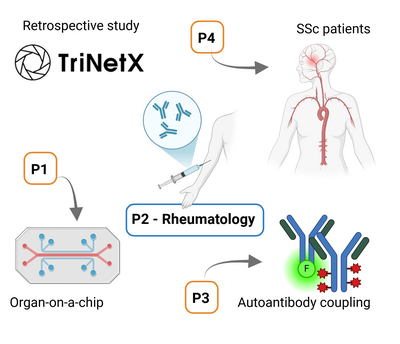Advanced imaging and in vitro models to investigate autoantibody-driven cerebrovascular dysfunction in systemic sclerosis
Project 2 will combine in vitro experiments, patient studies, and a retrospective clinical study using a global real-world database to decipher the role of autoantibodies in endothelial dysfunction occurring in autoimmune diseases such as SSc. It is conducted by the Department of Rheumatology and Clinical Immunology. The study population comprises SSc patients, especially those who suffer from neurological impairment. Together with P4, these patients will be examined for microvascular alterations in the eyes. In addition to this prospective study, a retrospective large-cohort study will be performed to investigate the relations between SSc, cerebrovascular pathologies, and vascular dementia.
Together with P1 a brain vessel-on-a-chip model will be developed and autoantibody effects on its barrier function will be investigated. This advanced three-dimensional in vitro model serves as a human-relevant alternative to animal experiments, enabling detailed mechanistic studies of autoantibody-induced endothelial dysfunction while reducing reliance on in vivo models. It will be used in close collaboration with P1 for comparative analysis with murine vascular models and with P3 to integrate MPI applications. With support and feedback from P3, an optimized conjugation strategy for generating a magnetic particle autoantibody-coupled tracer (AcMP) will be developed, ensuring high binding efficiency and stability. This tracer will be applied to track and quantify real-time interactions between autoantibodies and endothelial cells, enhancing our understanding of autoantibody-driven vascular pathology.
Principle Investigator

Dr. Anja Stähle
Dr. Hanna Grasshoff

Dr. Susanne Schinke
Jessica Schnohr (PhD cand.)


